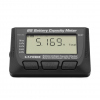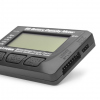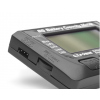Multifunctional measuring device enabling battery condition testing, discharging and balancing Lithium batteries and testing servos and speed controllers.
Lithium battery testing
The device enables the measurement of 2-8S lithium batteries (Li-Po, Li-ion, LiFe, LiHV) without the need for additional power supply. To test 1S accumulators, you need to connect 4 NiXX battery or UBEC stabilizer output 5V to NiCd/MH socket. The battery under test is connected with a JST-XH balance connector.
The tester measures and displays:
- total battery voltage and residual battery capacity (state of charge - approximate data)
- voltage and residual capacity of individual cells of the set
- voltage and capacity of the cell of the set with the highest voltage
- voltage and capacity of the cell of the set with the lowest voltage
- cell numbers with the highest and lowest voltage and the voltage difference between them
Testing of NiCd and NiMH batteries
Testing 4-8S NiCd and NiMH batteries do not require an additional power source. For testing NiCd and NiMH batteries with less than 4 cells, a 2-8S lithium battery must be connected.
The tester measures and displays:
- total battery voltage
Discharger/Balancer
Lithium batteries can be discharged/balanced in two modes (the device is powered from a discharged battery):
- Discharge with balancing – the tester discharges the connected lithium battery to a pre-set voltage (2.0-4.2 V/cell) while equalizing the voltage of the individual cells
- Autonomous balancing - the device discharges the cells of the set to the level of the cell with the lowest voltage
Servo tester
The supply voltage for the servo tester function is 5-6 V (four-cell NiMH or NiCd battery or 5V UBEC output). In the case of testing ESCs with BEC, a separate power supply is not required. The servo tester generates control pulses with a logic "1" level of 4.7-5.0 V (depending on the supply voltage 5-6 V). Depending on the type of servo or ESC, you can choose the pulse frequency of the servo tester signal: 50Hz (for analog servos and regular ESCs for airplanes, cars and ships) and for digital servos and ESCs for multicopters 60 Hz, 100 Hz, 125 Hz, 200 Hz, 300 Hz .
The servo tester has three basic operating modes:
- Manual adjustment of the servo position with a rotary knob - the range of control pulse widths in this mode can be selected to the basic 1000-2000 µs or extended 500-2500 µs.
- Automatic servo overrun – in this mode, the servo automatically overruns within the set range (basic 1000-2000 µs or extended 500-2500 µs) at a manually adjustable speed.
- Neutral setting: – in this case, the servo tester provides a signal with a fixed pulse width of 1500 µs.
Key Features
- Input Voltage: 2-8S LiXX, 4-8S NiXX (or 5V BEC)
- Discharge voltage: 2-4.2V per cell
- PWM pulse width for neutral: 1500uS
- PWM Range: Basic 1000-2000uS / Advanced 500-2500uS
- PWM frequency: 50/60/100/125/200/300Hz
- Size: 82x55x16mm
- Weight: 51g
Package Includes
- 1x Tester




